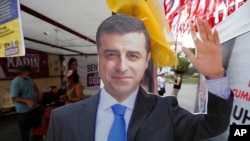A delegation from one of Turkey's biggest pro-Kurdish political parties met a leading figure of the Kurdish movement in prison Saturday, the latest step in a tentative process to end the country's 40-year conflict, the party said.
Three senior figures from the Peoples' Equality and Democracy Party (DEM) met the party's former co-chairperson, Selahattin Demirtas, at Edirne prison near the Greek border.
The meeting with Demirtas — jailed in 2016 on terrorism charges that most observers, including the European Court of Human Rights, have labelled politically motivated — took place two weeks after DEM members met Abdullah Ocalan, the imprisoned head of the Kurdistan Workers' Party (PKK).
While the PKK has led an armed insurgency against the Turkish state since the 1980s, the DEM is the latest party representing left-leaning Kurdish nationalism. Both DEM and its predecessors have faced state measures largely condemned as repression, including the jailing of elected officials and the banning of parties.
In a statement released on social media after the meeting, Demirtas called on all sides to "focus on a common future where everyone, all of us, will win."
Demirtas credited Ocalan with raising the chance that the PKK could lay down its arms. Ocalan has been jailed on Imrali island in the Sea of Marmara since 1999 for treason over his leadership of the PKK, considered a terrorist organization by Turkey and most Western states.
Demirtas led the DEM between 2014 and 2018, when it was known as the Peoples' Democratic Party (HDP) and he is still widely admired. He said that despite "good intentions," it was necessary for "concrete steps that inspire confidence … to be taken quickly."
One of the DEM delegation, Ahmet Turk, said: "I believe that Turks need Kurds and Kurds need Turks. Our wish is for Turkey to come to a point where it can build democracy in the Middle East."
The armed conflict between the PKK and the Turkish state, which started in August 1984 and has claimed tens of thousands of lives, has seen several failed attempts at peace.
Despite being imprisoned for a quarter of a century, Ocalan remains central to any chance of success due to his ongoing popularity among many of Turkey's Kurds. In a statement released on December 29, he signaled his willingness to "contribute positively" to renewed efforts.
Meanwhile, in an address Saturday to ruling party supporters in Diyarbakir, the largest city in the Kurdish-majority southeast, Turkish President Recep Tayyip Erdogan called for the disbandment of the PKK and the surrender of its weapons.
This would allow DEM "the opportunity to develop itself, strengthening our internal front against the increasing conflicts in our region, in short, closing the half-century-old separatist terror bracket and consigning it to history ... forever," he said in televised comments.
The latest drive for peace came when Devlet Bahceli, leader of the far-right Nationalist Movement Party and a close ally of Erdogan, surprised everyone in October when he suggested that Ocalan could be granted parole if he renounced violence and disbanded the PKK.
Erdogan offered tacit support for Bahceli's suggestion a week later, and Ocalan said he was ready to work for peace, in a message conveyed by his nephew.




